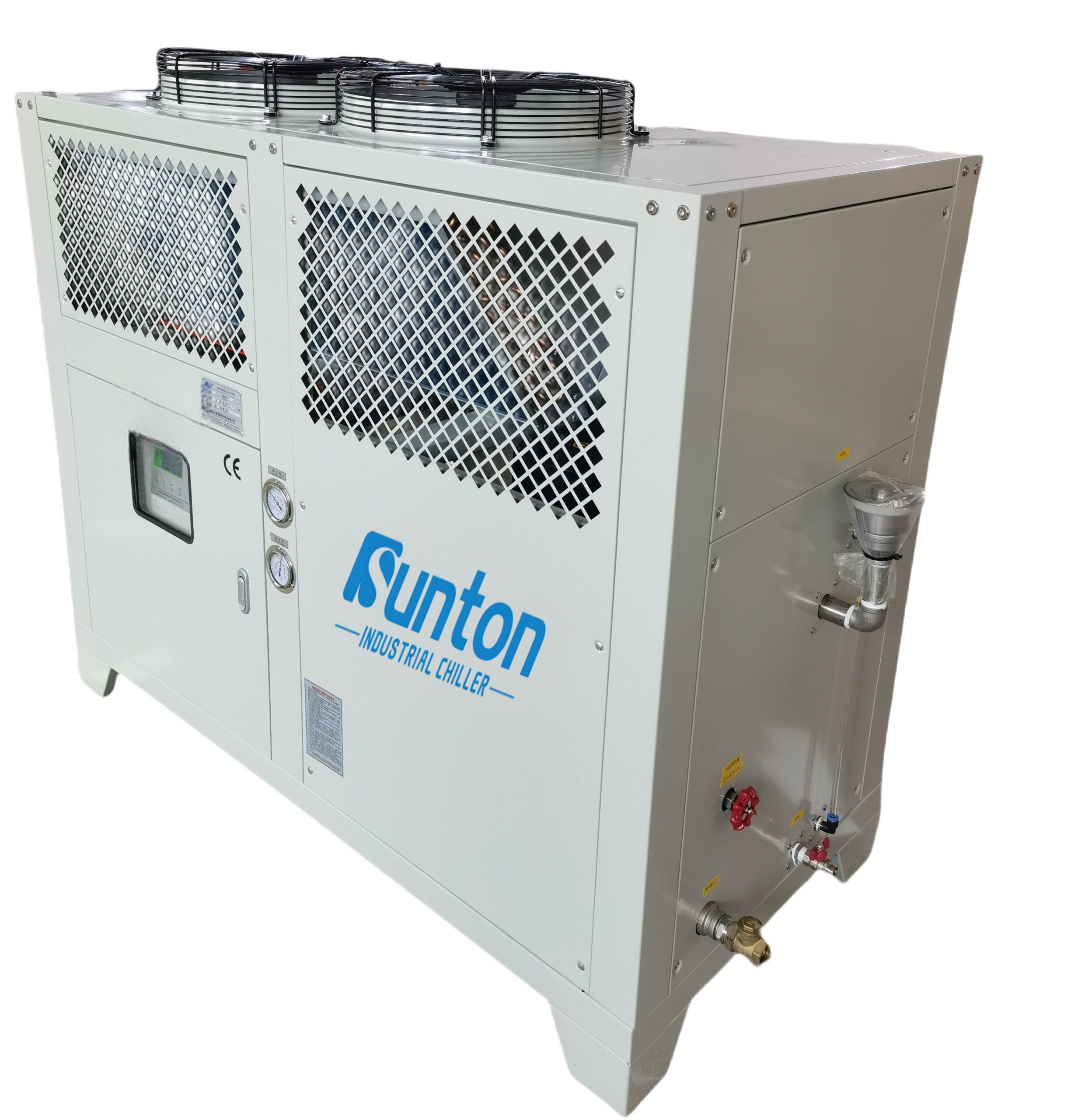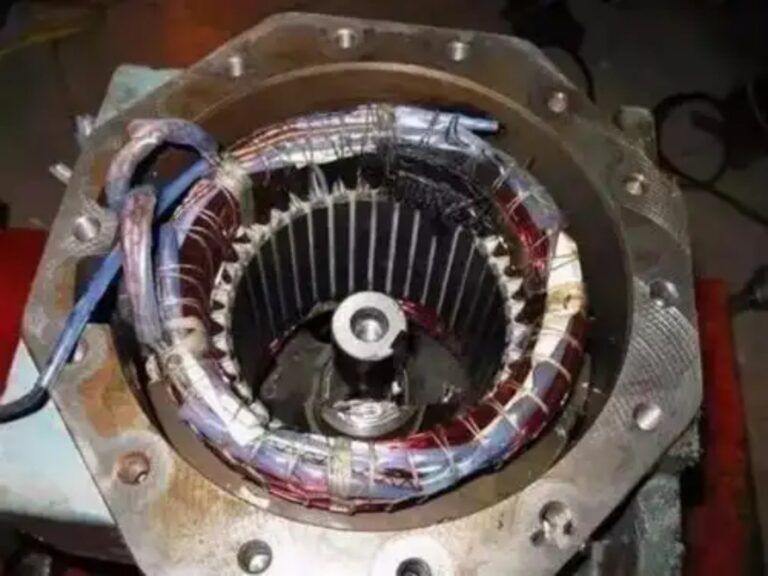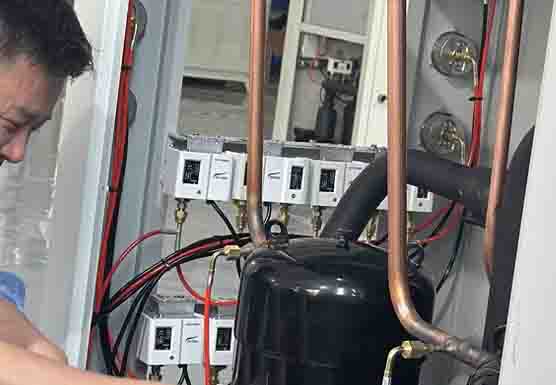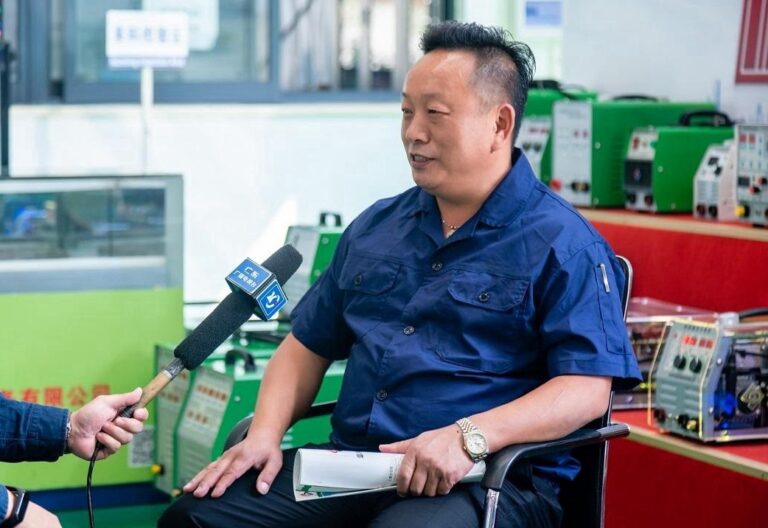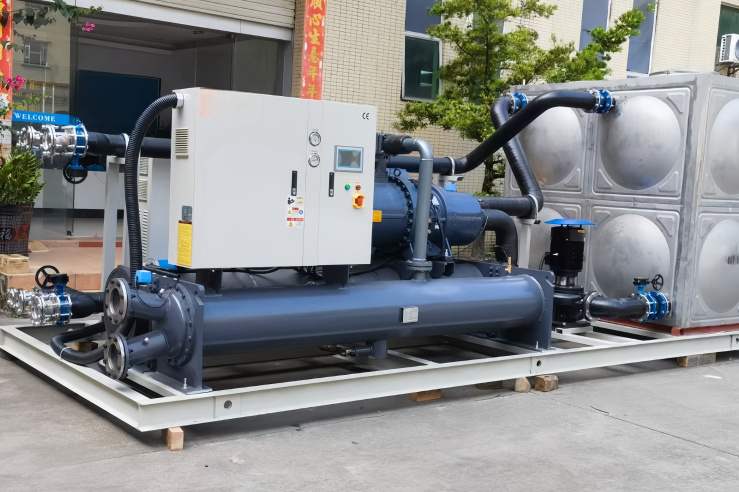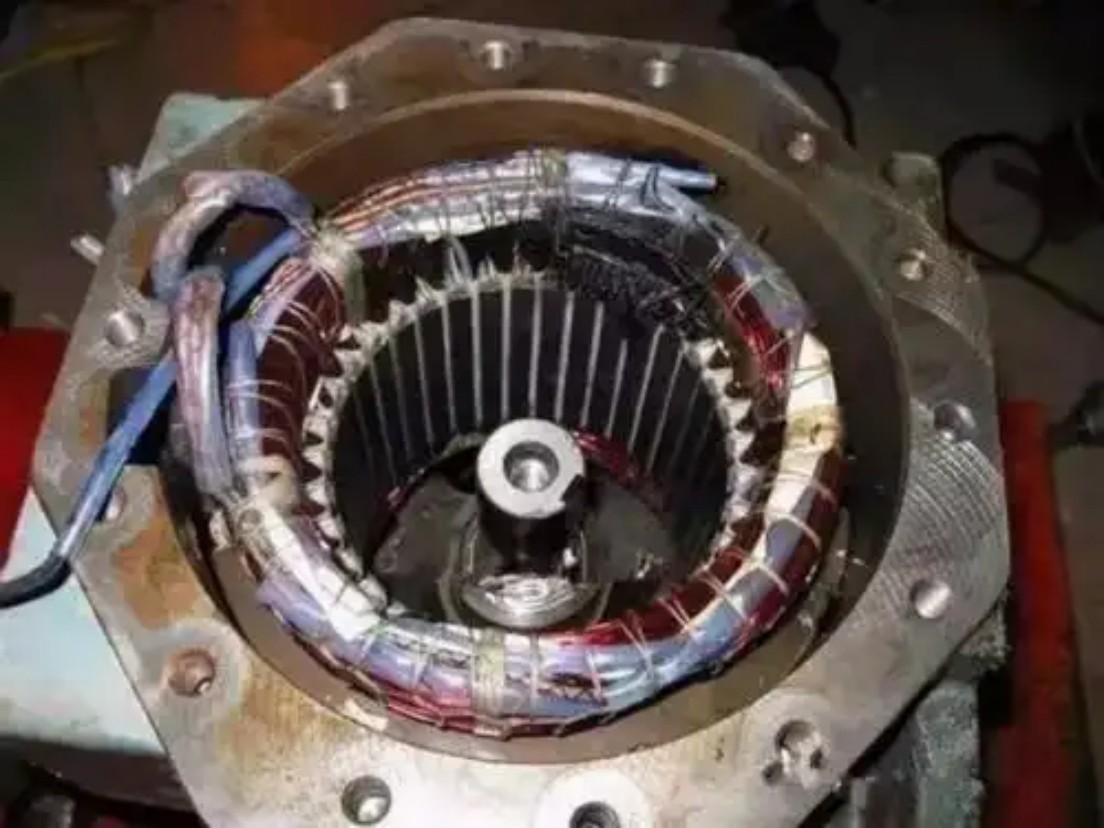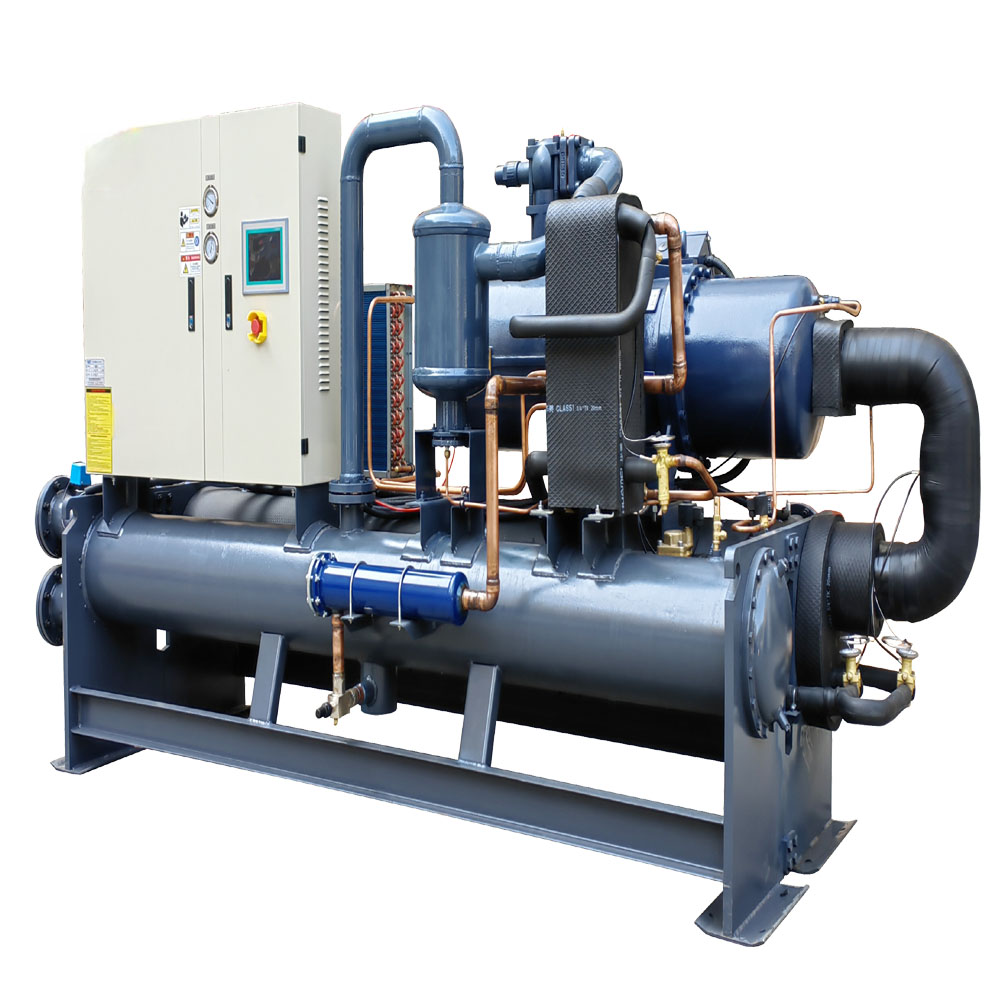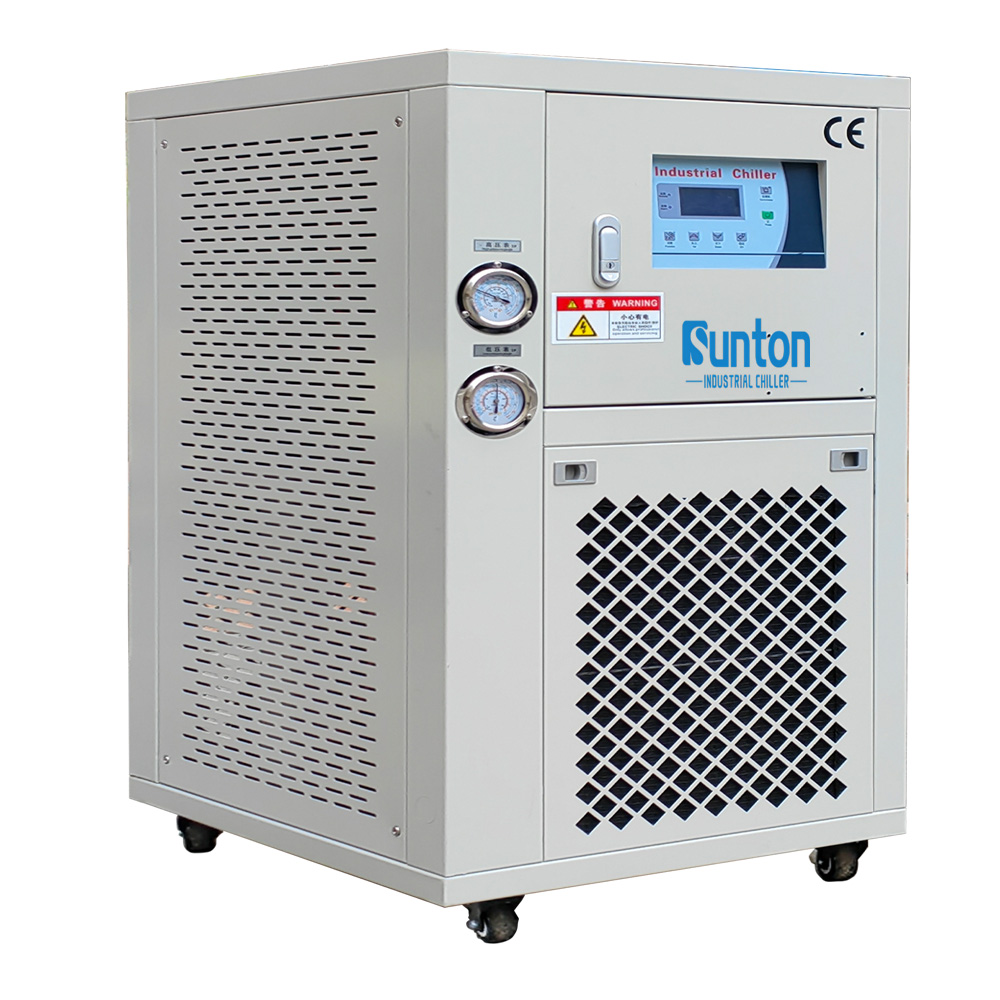-
Khu công nghiệp Dalingshan Quảng Đông
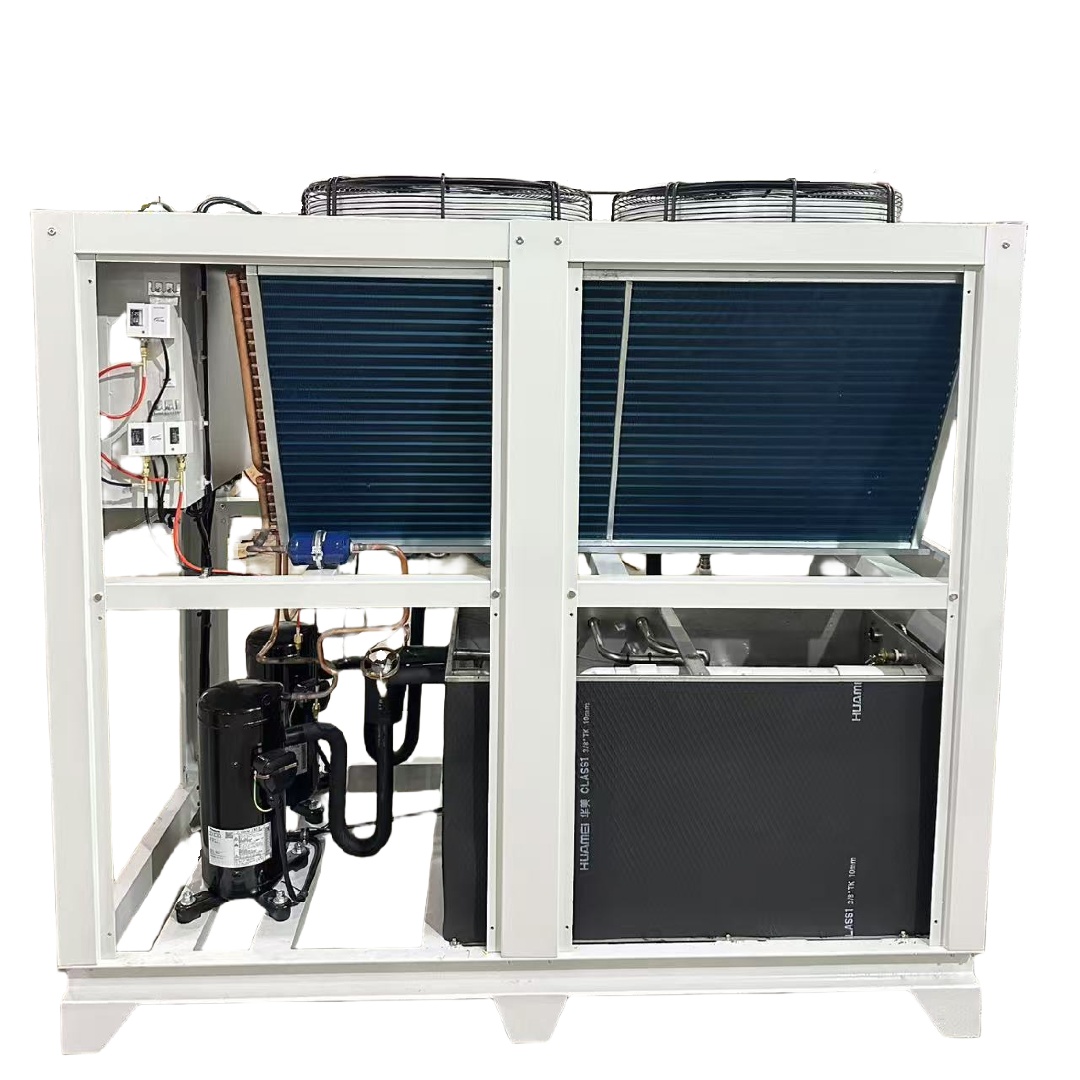
chọn máy làm lạnh 5 yếu tố cần cân nhắc
5 yếu tố chính cần cân nhắc khi mua máy làm lạnh công nghiệp
Bài viết này khám phá các yếu tố cần thiết cần xem xét khi lựa chọn máy làm lạnh cho các ứng dụng công nghiệp. Lựa chọn đúng máy làm lạnh công nghiệp đơn vị cho nhu cầu cụ thể của bạn có thể tác động đáng kể đến hiệu quả và tuổi thọ của hoạt động của bạn. Đọc bài đăng này sẽ cung cấp cho bạn sự hiểu biết toàn diện về các yếu tố này, cho phép bạn đưa ra quyết định sáng suốt giúp tối ưu hóa các quy trình công nghiệp của bạn và cuối cùng là tiết kiệm thời gian và tiền bạc. Là một công ty công nghiệp hàng đầu máy làm lạnh Là nhà sản xuất, chúng tôi cam kết cung cấp các giải pháp chất lượng cao phù hợp với nhu cầu công nghiệp đa dạng.
Mục lục
Máy làm lạnh công nghiệp là gì và hoạt động như thế nào?
MỘT máy làm lạnh công nghiệp là một hệ thống làm lạnh loại bỏ nhiệt từ một quy trình hoặc thiết bị. Nó hoạt động bằng cách lưu thông một chất lỏng làm mát, thường là nước hoặc hỗn hợp nước/glycol, thông qua một hệ thống làm lạnh của các thành phần chính, bao gồm một máy nén, Một tụ điện, MỘT máy bốc hơivà một van tiết lưu. máy làm lạnh sử dụng các nguyên tắc của làm lạnh để hấp thụ nhiệt từ quá trình này và truyền đi nơi khác, làm mát hiệu quả khu vực hoặc thiết bị mong muốn. Máy làm lạnh đóng vai trò quan trọng trong việc duy trì nhiệt độ hoạt động tối ưu cho nhiều quy trình công nghiệp khác nhau. Sự khác biệt chính giữa máy làm lạnh bằng không khí và một máy làm lạnh giải nhiệt bằng nước là phương pháp mà chúng loại bỏ nhiệt. Một máy làm lạnh bằng không khí sử dụng môi trường xung quanh không khí để làm mát chất làm lạnh, trong khi một máy làm lạnh giải nhiệt bằng nước sử dụng nước từ một làm mát tháp nước hoặc nguồn nước khác.
Tại sao việc lựa chọn kích thước máy làm lạnh phù hợp lại quan trọng?
Lựa chọn đúng kích thước máy làm lạnh là rất quan trọng cho hoạt động hiệu quả và tiết kiệm chi phí. Một quá khổ máy làm lạnh sẽ bật và tắt thường xuyên, dẫn đến tăng hao mòn trên máy nén và giảm hiệu quả năng lượng. Ngược lại, một kích thước nhỏ máy làm lạnh sẽ đấu tranh để đáp ứng làm mát nhu cầu, dẫn đến không đủ làm mát và khả năng gây hư hỏng cho thiết bị xử lý. Là một máy làm lạnh nhà sản xuất, chúng tôi nhấn mạnh tầm quan trọng của việc định cỡ đúng cách máy làm lạnh đơn vị để phù hợp với cụ thể công suất làm mát bắt buộc. Xác định yêu cầu công suất làm mát phụ thuộc vào các yếu tố như tải nhiệt được tạo ra bởi quá trình, mong muốn nhiệt độ chất lỏng làm mátvà nhiệt độ môi trường.
Môi trường vận hành ảnh hưởng thế nào đến hiệu suất của máy làm lạnh?
Các môi trường hoạt động đóng một vai trò quan trọng trong hiệu suất làm lạnh. Các yếu tố như nhiệt độ môi trường, độ ẩm và chất lượng không khí có thể ảnh hưởng đến máy làm lạnh khả năng để tản nhiệt một cách hiệu quả. Ví dụ, nhiệt độ môi trường cao có thể làm giảm công suất làm lạnh của máy làm lạnh, trong khi độ ẩm cao có thể dẫn đến sự ăn mòn và giảm hiệu quả. Ngoài ra, hệ thống làm lạnh sử dụng môi trường xung quanh không khí để loại bỏ nhiệt từ tụ điện, vì vậy điều quan trọng là phải duy trì đúng không khí xung quanh nhiệt độ cho không phải bên ngoài được đánh giá máy làm lạnh. Chúng tôi đã tạo ra một Máy làm lạnh chống nổ nhằm đáp ứng nhu cầu của ngành công nghiệp hóa chất và dược phẩm.
Điều cần thiết là phải xem xét các điều kiện môi trường cụ thể của cơ sở của bạn khi lựa chọn máy làm lạnh. Chúng tôi, như đã trải nghiệm máy làm lạnh nhà sản xuất, có thể hướng dẫn bạn lựa chọn một máy làm lạnh được thiết kế để chịu được những thách thức cụ thể của bạn môi trường hoạt động. Ví dụ, nếu cơ sở của bạn nằm ở nơi có khí hậu nóng và ẩm, máy làm lạnh giải nhiệt bằng nước với vật liệu chống ăn mòn có thể là lựa chọn tốt hơn.
Yêu cầu về áp suất và lưu lượng cho máy làm lạnh là gì?
Hiểu được yêu cầu về áp suất và lưu lượng của quy trình của bạn là rất quan trọng khi mua máy làm lạnh. Tốc độ dòng chảy, đó là thể tích chất lỏng mà máy làm lạnh có thể lưu thông trong một đơn vị thời gian là một yếu tố quan trọng. Mất áp suất trên toàn hệ thống là sự giảm áp suất chất lỏng xảy ra khi chất lỏng di chuyển qua các đường ống, phụ kiện và thiết bị. Nếu bạn có một hệ thống có nhiều quy trình chạy cùng một lúc máy làm lạnh, điều quan trọng là phải đảm bảo máy làm lạnh Máy bơm có thể đáp ứng nhu cầu về lưu lượng và áp suất cho từng quy trình cùng một lúc. Đồng hồ đo áp suất cần xác định áp suất bơm để có được lưu lượng thích hợp cho từng máy.
Một máy bơm có kích thước nhỏ sẽ làm giảm khả năng làm mát của máy bơm hoặc thậm chí ngăn chặn dòng chảy xảy ra. Như một máy làm lạnh nhà sản xuất, chúng tôi hiểu tầm quan trọng của các thông số này. máy làm lạnh được thiết kế để đáp ứng các yêu cầu cụ thể về áp suất và lưu lượng, đảm bảo hiệu suất và truyền nhiệt tối ưu. Chúng tôi cũng cung cấp các tùy chọn tùy chỉnh để điều chỉnh máy làm lạnh theo nhu cầu chính xác của bạn, bao gồm nhiều kích cỡ máy bơm và cấu hình lưu lượng khác nhau.
Làm thế nào để tối đa hóa hiệu quả năng lượng trong hệ thống làm lạnh của bạn?
Hiệu quả năng lượng là một cân nhắc quan trọng cho bất kỳ hoạt động công nghiệp nào, và máy làm lạnh không phải là ngoại lệ. Tối ưu hóa máy làm lạnh hệ thống hiệu quả năng lượng có thể dẫn đến tiết kiệm chi phí đáng kể và giảm tác động đến môi trường. Một trong những cách hiệu quả nhất để cải thiện hiệu quả năng lượng là lựa chọn đúng máy làm lạnh kích thước cho ứng dụng của bạn. Một kích thước quá khổ máy làm lạnh sẽ hoạt động không hiệu quả, trong khi một quy mô nhỏ máy làm lạnh sẽ đấu tranh để đáp ứng làm mát nhu cầu, dẫn đến mức tiêu thụ năng lượng cao hơn.
Một yếu tố quan trọng khác là máy làm lạnh thiết kế và công nghệ. Hiện đại máy làm lạnh kết hợp các tính năng tiên tiến như ổ đĩa tốc độ thay đổi, cho phép máy nén để điều chỉnh đầu ra của nó dựa trên làm mát tải, dẫn đến tiết kiệm năng lượng đáng kể. Tại các nhà máy sản xuất của chúng tôi, chúng tôi ưu tiên hiệu quả năng lượng trong máy làm lạnh thiết kế. Của chúng tôi máy làm lạnh sử dụng các công nghệ và thành phần mới nhất, chẳng hạn như hiệu suất cao máy nén và hệ thống điều khiển tiên tiến, nhằm giảm thiểu mức tiêu thụ năng lượng trong khi tối đa hóa hiệu suất.
Sau đây là bảng tóm tắt những điểm khác biệt chính giữa máy làm lạnh bằng không khí và máy làm lạnh bằng nước:
| Tính năng | Máy làm lạnh bằng không khí | Máy làm lạnh giải nhiệt bằng nước |
| Loại bỏ nhiệt | Sử dụng không khí xung quanh | Sử dụng nước từ tháp giải nhiệt hoặc nguồn khác |
| Hiệu quả | Nói chung kém hiệu quả hơn ở những vùng có khí hậu nóng | Hiệu quả hơn, đặc biệt là ở những vùng có khí hậu nóng |
| Cài đặt | Lắp đặt dễ dàng hơn, không cần tháp giải nhiệt | Lắp đặt phức tạp hơn, cần có tháp giải nhiệt hoặc nguồn nước |
| BẢO TRÌ | Bảo trì thấp hơn, ít thành phần hơn | Bảo trì cao hơn do có tháp giải nhiệt |
| Dấu chân | Dấu chân nhỏ hơn | Dấu chân lớn hơn do tháp giải nhiệt |
Nhiệt độ chất lỏng làm mát ảnh hưởng đến việc lựa chọn máy làm lạnh như thế nào?
Các nhiệt độ chất lỏng làm mát là một cái khác yếu tố then chốt để xem xét khi lựa chọn một máy làm lạnh. Các quy trình khác nhau đòi hỏi phạm vi nhiệt độ khác nhau và việc lựa chọn máy làm lạnh có khả năng đạt được và duy trì nhiệt độ mong muốn là điều cần thiết. Ví dụ, một số ứng dụng trong ngành thực phẩm và đồ uống có thể cần nhiệt độ gần đóng băng, trong khi những loại khác chỉ cần làm mát vừa phải. Sau đây là hình ảnh ngẫu nhiên từ mảng được cung cấp:
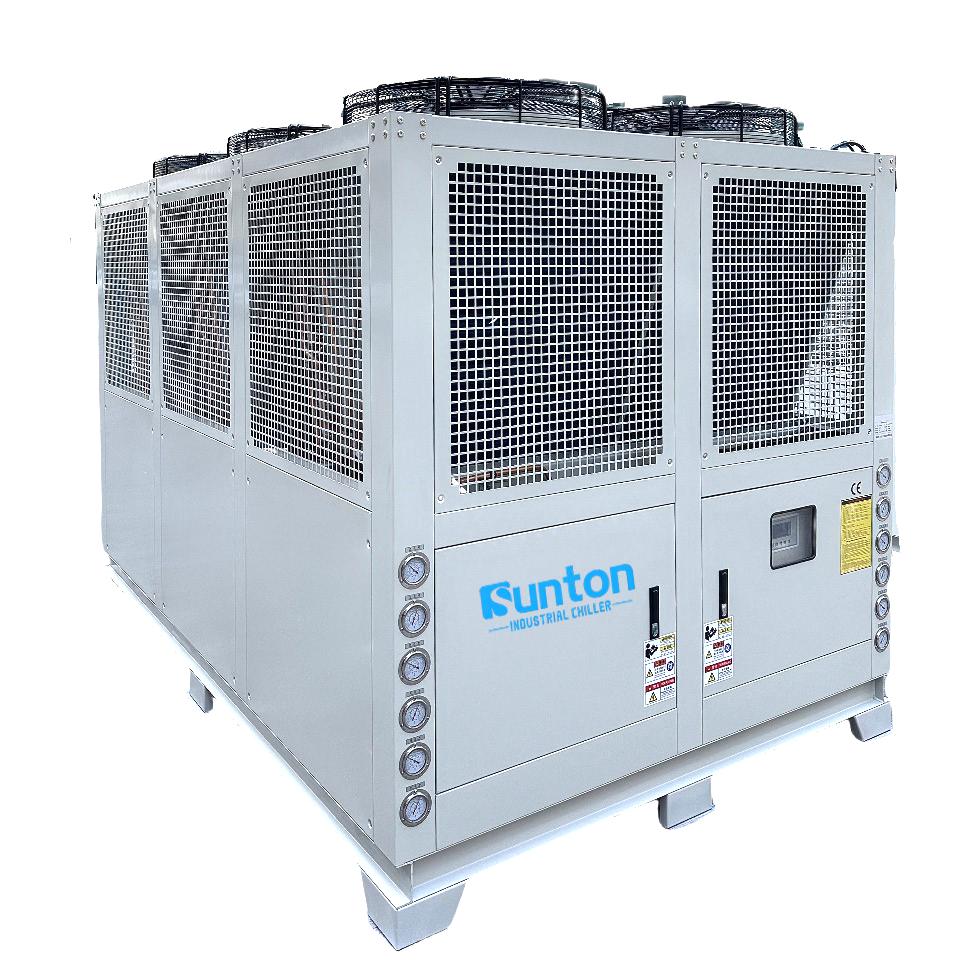
Như một máy làm lạnh nhà sản xuất, chúng tôi cung cấp một loạt các máy làm lạnh được thiết kế để hoạt động trong phạm vi nhiệt độ cụ thể. máy làm lạnh có thể được tùy chỉnh để đáp ứng các yêu cầu nhiệt độ cụ thể của quy trình của bạn, đảm bảo hiệu suất và chất lượng sản phẩm tối ưu. Máy làm lạnh Glycol có thể đạt nhiệt độ thực sự thấp để đáp ứng nhu cầu cụ thể của ngành.
Bộ bay hơi đóng vai trò gì trong hiệu suất làm lạnh?
Các máy bốc hơi là một thành phần quan trọng của máy làm lạnh hệ thống chịu trách nhiệm hấp thụ nhiệt từ chất lỏng trong quá trình. máy bay hơi thiết kế và hiệu quả tác động trực tiếp đến máy làm lạnh hiệu suất tổng thể và công suất làm mát.
Có nhiều loại khác nhau máy bốc hơi, bao gồm thiết kế vỏ và ống, tấm hàn và kênh vi mô. Mỗi loại đều có ưu điểm và nhược điểm về hiệu suất truyền nhiệt, giảm áp suất và chi phí. Là một máy làm lạnh nhà sản xuất, chúng tôi lựa chọn cẩn thận máy bốc hơi loại và kích thước để tối ưu hóa hiệu suất làm lạnh cho từng ứng dụng cụ thể. Của chúng tôi máy làm lạnh sử dụng chất lượng cao máy bốc hơi được thiết kế để truyền nhiệt và hiệu quả tối đa, đảm bảo độ tin cậy và nhất quán làm mát.
Bạn nên cân nhắc những gì khi lắp đặt máy làm lạnh?
Lắp đặt máy làm lạnh là một khía cạnh quan trọng có thể tác động đáng kể đến máy làm lạnh hiệu suất và tuổi thọ. Việc lắp đặt đúng cách đảm bảo rằng máy làm lạnh hoạt động hiệu quả và an toàn trong khi giảm thiểu rủi ro hỏng hóc và sửa chữa tốn kém. Là một công nghiệp hàng đầu máy làm lạnh công ty, chúng tôi muốn cung cấp chất lượng cao Máy làm lạnh công nghiệp cho nông nghiệp.
Một số yếu tố cần được xem xét trong quá trình lắp đặt máy làm lạnh, bao gồm vị trí, yêu cầu về không gian, thông gió và kết nối điện. máy làm lạnh nên được lắp đặt ở khu vực thông gió tốt với khoảng cách đủ để bảo trì và lưu thông không khí. Các kết nối điện đầy đủ cũng rất cần thiết để đảm bảo máy làm lạnh nhận được điện áp và cường độ dòng điện chính xác.
Tại sao bảo trì thường xuyên lại quan trọng đối với tuổi thọ của máy làm lạnh?
Bảo trì thường xuyên là điều cần thiết để đảm bảo tuổi thọ và hiệu suất tối ưu của máy làm lạnh hệ thống. Một hệ thống được bảo trì tốt máy làm lạnh hoạt động hiệu quả hơn, tiêu thụ ít năng lượng hơn và có tuổi thọ cao hơn, giúp bạn tiết kiệm tiền chi phí vận hành và sửa chữa.
Nhiệm vụ bảo trì thường xuyên bao gồm vệ sinh tụ điện cuộn dây, kiểm tra mức chất làm lạnh, kiểm tra máy bốc hơivà thử nghiệm hệ thống điều khiển. Là một máy làm lạnh nhà sản xuất, chúng tôi cung cấp dịch vụ bảo trì toàn diện để giữ cho máy làm lạnh chạy trơn tru và hiệu quả.
Các nghiên cứu điển hình: Ví dụ thực tế về việc lựa chọn máy làm lạnh
Nghiên cứu tình huống 1: Ngành công nghiệp nhựa và cao su
Một công ty sản xuất nhựa đã phải thường xuyên ngừng hoạt động do máy ép phun của họ quá nóng. Sau khi phân tích quy trình và làm mát yêu cầu, chúng tôi đề nghị một máy làm lạnh giải nhiệt bằng nước với ổ đĩa tốc độ thay đổi máy nén. Cái mới máy làm lạnh cung cấp khả năng kiểm soát nhiệt độ chính xác và cải thiện hiệu quả năng lượng, dẫn đến giảm 30% chi phí năng lượng và giảm đáng kể thời gian ngừng sản xuất. Máy làm lạnh trung tâm trục vít giải nhiệt bằng nước là sự lựa chọn hoàn hảo cho nhu cầu công nghiệp của bạn.
Nghiên cứu tình huống 2: Ngành thực phẩm và đồ uống
Một nhà máy bia đang phải vật lộn để duy trì nhiệt độ lên men ổn định, ảnh hưởng đến chất lượng bia của họ. Chúng tôi đã cung cấp cho họ một glycol được thiết kế riêng máy làm lạnh hệ thống có thể đạt được và duy trì nhiệt độ thấp cần thiết. Hệ thống mới máy làm lạnh hệ thống đã cải thiện chất lượng sản phẩm và tăng năng lực sản xuất thêm 25%.
Câu hỏi thường gặp
Sự khác biệt giữa máy làm lạnh làm mát bằng không khí và máy làm lạnh làm mát bằng nước là gì?
MỘT máy làm lạnh bằng không khí sử dụng môi trường xung quanh không khí để làm mát chất làm lạnh, trong khi một máy làm lạnh giải nhiệt bằng nước sử dụng nước từ một làm mát tháp nước hoặc nguồn nước khác. Máy làm lạnh giải nhiệt bằng nước thường hiệu quả hơn, đặc biệt là ở những vùng có khí hậu nóng, nhưng đòi hỏi lắp đặt phức tạp hơn.
Làm thế nào để xác định kích thước máy làm lạnh phù hợp cho ứng dụng của tôi?
Xác định quyền kích thước máy làm lạnh bao gồm việc tính toán tải nhiệt được tạo ra bởi quy trình của bạn, xem xét mong muốn nhiệt độ chất lỏng làm mátvà tính đến nhiệt độ môi trường. Tốt nhất là nên tham khảo ý kiến của một máy làm lạnh nhà sản xuất hoặc chuyên gia HVAC có kinh nghiệm để đảm bảo kích thước phù hợp.
Tuổi thọ trung bình của máy làm lạnh công nghiệp là bao lâu?
Tuổi thọ của một máy làm lạnh công nghiệp có thể thay đổi tùy thuộc vào các yếu tố như cách sử dụng, bảo trì và môi trường hoạt động. Tuy nhiên, với việc bảo trì thích hợp, một máy làm lạnh có thể tồn tại 15-20 năm hoặc thậm chí lâu hơn.
Tôi nên bảo dưỡng máy làm lạnh bao lâu một lần?
Bạn nên có máy làm lạnh được bảo dưỡng ít nhất một lần một năm bởi một kỹ thuật viên có trình độ. Tuy nhiên, có thể cần bảo dưỡng thường xuyên hơn tùy thuộc vào máy làm lạnh điều kiện sử dụng và vận hành. Chúng tôi cung cấp hàng đầu Máy làm lạnh công nghiệp cho ngành dệt may.
Máy làm lạnh có thể sử dụng cho cả mục đích sưởi ấm và làm mát không?
Vâng, một số máy làm lạnh được thiết kế để cung cấp cả sưởi ấm và làm mát. Chúng được gọi là máy bơm nhiệt máy làm lạnhvà họ có thể đảo ngược làm lạnh chu trình cung cấp nhiệt khi cần thiết.
Một số dấu hiệu phổ biến nào cho thấy máy làm lạnh của tôi cần được sửa chữa?
Một số dấu hiệu phổ biến cho thấy bạn máy làm lạnh có thể cần sửa chữa bao gồm giảm công suất làm mát, tiếng ồn hoặc rung động bất thường, rò rỉ và bật tắt liên tục.
Những điểm chính
- Lựa chọn đúng đắn máy làm lạnh công nghiệp rất quan trọng để vận hành hiệu quả và tiết kiệm chi phí.
- Kích thước máy làm lạnh, môi trường hoạt động, yêu cầu về áp suất và lưu lượng, nhiệt độ chất lỏng làm mát, máy bốc hơi loại, lắp đặt và bảo trì là các yếu tố chính để xem xét.
- Hiệu quả năng lượng có thể được tối đa hóa bằng cách chọn đúng máy làm lạnh kích thước, sử dụng công nghệ tiên tiến và thực hiện các biện pháp bảo trì phù hợp.
- Bảo trì thường xuyên là điều cần thiết để đảm bảo tuổi thọ và hiệu suất tối ưu của máy làm lạnh hệ thống.
- Tư vấn với một người có uy tín máy làm lạnh nhà sản xuất như chúng tôi có thể giúp bạn lựa chọn tốt nhất máy làm lạnh cho nhu cầu cụ thể của bạn và đảm bảo lắp đặt và bảo trì đúng cách.
- Chúng tôi có nhiều loại sản phẩm từ Máy làm lạnh sữa đến công nghiệp máy làm lạnh cho bất kỳ nhu cầu cụ thể nào của bạn.
Bằng cách hiểu các yếu tố này và làm việc với một đối tác đáng tin cậy như chúng tôi, bạn có thể tối ưu hóa các quy trình công nghiệp, cải thiện chất lượng sản phẩm và giảm chi phí vận hành. Liên hệ với chúng tôi ngay hôm nay để tìm hiểu thêm về cách chúng tôi máy làm lạnh có thể mang lại lợi ích cho doanh nghiệp của bạn và giúp bạn đạt được mục tiêu sản xuất.
